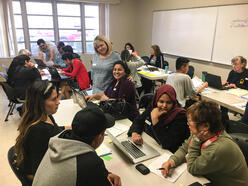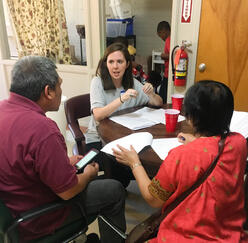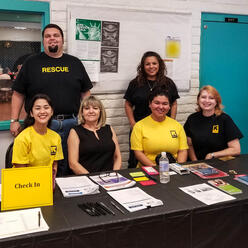
It was not surprising that the mood was upbeat at the recent New Americans Campaign (NAC) workshop in Phoenix. At the workshop, immigrants and refugees took the first step to becoming a U.S. citizen by completing an application. While for those gathered it was only a step, it was a key step and optimism was evident.
This particular NAC workshop was sponsored by the International Rescue Committee (IRC) in Phoenix and four partner agencies: Catholic Charities, Friendly House, Promise Arizona, and OCA-Phoenix. In addition, two partner agencies, Campesinos Sin Fronteras and Chicanos Por La Causa coordinate workshops in the Somerton, Arizona area. The IRC acts as site leader for the participating agencies in Arizona, helping to plan and coordinate joint workshops.
It is not easy to become a United States citizen. Immigrants have to be committed and focused. They have to be in the United States legally for at least five years. They have to pass an English exam and a test measuring their knowledge of U.S. history and civics. They must pay $725 or get a waiver. Finally, they have to demonstrate good moral character long before they apply for U.S. Citizenship.
The 25 or so potential citizens at a central Phoenix church on a Saturday morning in February were in varying phases in the process. For some, this was a chance to see where they were in the process and what was necessary for them to progress. For others, the path was clear and the future bright.
“It’s good to see a good crowd. I’m glad to see these people seeking citizenship,” said Jim Oleson, a volunteer with the IRC in Phoenix. His role was to welcome people -- both clients and volunteers – and help them find what they needed. Like many other volunteers on this Saturday morning, he’s been at several such gatherings.
The first step in helping immigrants become new U.S. citizens is an assessment – determining if this person is ready to apply for citizenship.

Problems or issues? At the workshop were lawyers and accredited staff who could review the situation and offer help.
If everything looks good, the person can get help filing out an N-400, the Application for Naturalization. Then it’s a matter of waiting for a decision from the U.S. Citizenship and Immigration Services (USCIS) office. Approval can take over a year.
Workshops are generally held every other month. All services at the workshop are free. Between workshops, aspiring citizens can get help from the sponsoring agencies. In addition, each partner agency provides support in the application process and in such things as English and civics classes.
The IRC in Phoenix offers in-office citizenship and immigration services, as well as citizenship classes, in addition to their work with the NAC.

“It’s an upbeat program. We never have a problem getting volunteers,” said Michelle McConnaughay, of the citizenship workshops. She is the Community Integration Supervisor for the IRC in Phoenix.
McConnaughay noted that naturalized citizenship can be a difficult journey, but provides many privileges. New U.S. citizens can get a U.S. passport, vote in U.S. elections, and bring family members to the United States. The rewards are high for both the new citizen and for American society.
McConnaughay closed on a positive note, “We’re excited to help so many people fulfill their dreams of becoming a U.S. citizen, and we look forward to continuing this work!”
Interested in applying for citizenship or other immigration services? Contact Michelle McConnaughay at 602-433-2440 x178!
Story by Dennis Godfrey.